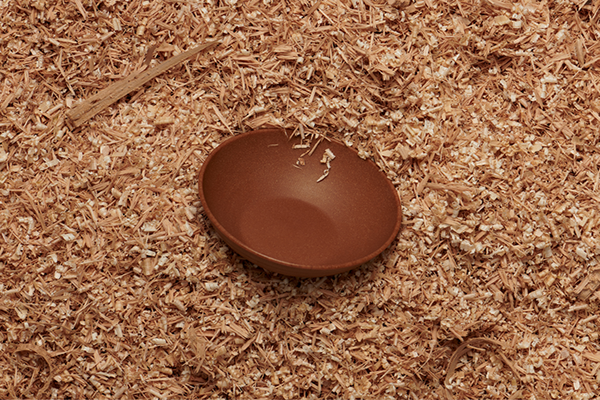kinari stands out as a high-strength material formed from cellulose fiber derived from various waste plant materials, bonded with a minimal amount of oil-based resin. The material’s unique and patented production process preserves its whiteness, offering versatility in terms of forms, colors, and textures.
What sets kinari apart is its eco-friendly production process, which significantly reduces CO2 emissions compared to traditional methods. The material utilizes a diverse range of waste substances, such as used coffee grounds, excess trees cleared from woodland, and residues from sake brewing, eliminating pressure on the food supply chain. The kinariTM team is continuously improving its biomass content, with the goal of achieving a 100% biomass formulation, eliminating the need for petroleum-based resin entirely. The material offers dual recycling methods – biological recycling through industrial compost and material recycling, contributing to a fully closed-loop society.
Explore kinari first hand
Panasonic Industry invites forward-thinking brands to explore kinari‘s potential and join in the mission to replace plastics with fully biodegradable, plant-based alternatives, contributing to a better life for all. A first opportunity to see products made of kinari and get to learn more about the features and benefits is the Bioplastics Innovation Forum in Munich, Germany. On the 6th of March, Mickaela Robertson, New Business Development Manager at Panasonic Industry Europe, will share insights and details about kinari: “Incorporating bioplastics into our sustainability strategy is part of our commitment to a greener future where innovation meets environmental responsibility. We are very excited to share our insights about kinari with interested companies from various industries.”
Businesses can seamlessly adopt kinari as an alternative to plastic without investing in new equipment. Several Japanese and international brands across several industries have already collaborated with Panasonic to develop products made with kinari, receiving positive feedback from customers. kinari is not just a sustainable material; it is a step towards Panasonic GREEN IMPACT initiative, aligning with the company’s commitment to a carbon-neutral, sustainable global environment.















